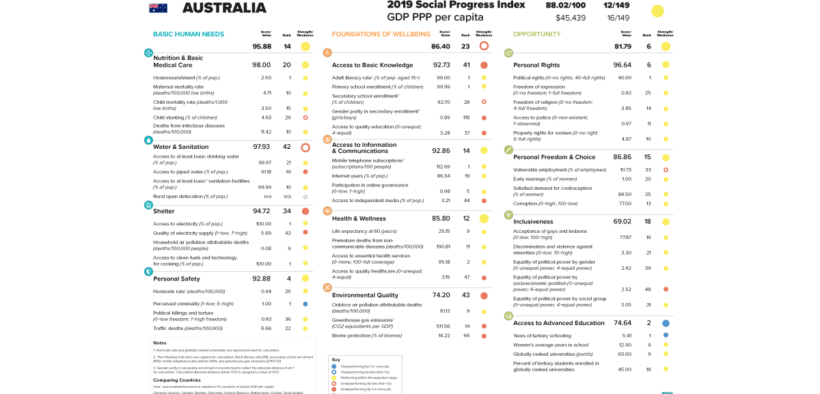Australia has been ranked 12th in the world on social progress for the second year in a row but has gradually declined in rankings since 2015, according to an index released today by the US-based Social Progress Imperative.
The Social Progress Imperative thinks of social progress as ‘the capacity of a society to meet the basic human needs of its citizens, as well as enhancing and sustaining the quality of their lives, to create the conditions for all individuals to reach their full potential.’ The Social Progress Imperative is partnering with the Centre for Social Impact to produce the Australian Social Progress Index, set to launch in November this year.
When compared with 15 countries of a similar GDP per capita, Australia’s overall score for 2019 falls within the expected range. This is also true of Australia’s relative performance in two of the index’s overarching domains, Basic Needs and Opportunity, where Australia achieved a global rank of 14th and 6th respectively.
Within the Opportunity domain, Australia over-performed on Access to Advanced Education, ranked 2nd overall.
However, Australia has underperformed against comparable countries in the third overarching domain, Foundations for Wellbeing. A poor score for Environmental Quality is pulling down the overall score for the domain – in particular the indicator for greenhouse gas emissions by GDP, where Australia ranks 99th.
One of the indicators to show the biggest drop in rank within this domain was Access to Independent Media, where Australia fell 19 spots this year to be ranked 44th in the world.
Professor Kristy Muir, CEO of the Centre for Social Impact, said the release of the global Social Progress Index for 2019 showed that Australia was making progress on some indicators but also revealed areas for improvement.
“The Social Progress Index for 2019 shows Australia holding steady within the top tier of global rankings and performing well on some important indicators. However Australia has significant room for improvement on environmental issues like greenhouse gas emissions and social issues like equal political power or equal access to quality healthcare,” said Professor Muir.
Muir said that large changes in ranking on particular indicators reveal the impact of public policy interventions or social developments.
“There is a lot of focus on GDP but it is a reductive and misleading yardstick for a country’s progress. While it can be useful to measure economic production and growth, it won’t reveal whether life is actually improving for the people.
The Social Progress Index tells a more complete story of how life is changing in a country by measuring a range of crucial indicators. And by revealing how countries are performing relative to one another, the index can also act as a prescriptive tool for policy-makers.
For example, policy-makers can be pleased that there is increasing acceptance of people who are sexually and gender diverse, but be concerned that Australia is falling behind on access to independent media.
I expect that CSI’s Australian social progress index, launching in November, will be even more useful for policy-makers, as it will reveal how each of our state and territories are performing relative to one another,” Muir said.
The Social Progress Index is the first holistic measure of a country’s social performance that is independent of economic factors. The index is based on a range of social and environmental indicators that capture three dimensions of social progress: Basic Human Needs, Foundations of Wellbeing, and Opportunity.
The 2019 Social Progress Index includes data from 149 countries on 51 indicators. It includes 95% of the world population. It is designed as a complement to GDP and other economic indicators to provide a more holistic understanding of countries’ overall performance. The Social Progress Index also provides a practical way to track progress against the UN’s Sustainable Development Goals (SDGs).
The 2019 Social Progress Index is generously supported by Deloitte and Skoll Foundation, along with other donors. Other contributors, including chief advisors Professors Michael E. Porter of Harvard Business School, and Scott Stern of MIT, are listed on our website.
Pearl Dy is a community manager and journalist. She is passionate about business and development particularly involving not-for-profits, charity and social entrepreneurship.























































































































































